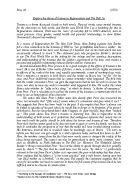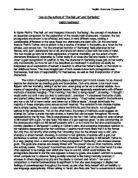Living in a patriarchal society makes Nicole dependent on a controlling figure to make ethical judgements for her. She waits for ‘Dick to make a moral comment’, rather than continuing to develop the individuality she was free to express in her private letters to Dick when explaining the mental health problems she was experiencing at that time. Similarly, when Buddy, who has never skied himself, ‘instructs’ Esther in the sport, she mindlessly obeys. ‘TisN’ Book 1 shows a complete contrast as Nicole is described as ‘happy to exist in a man’s world’ referring to her allowing a husband or lover to take charge, portrayed with both Dick and Tommy. Nicole is trapped in her feminine role in the 1930s as, although she feels that Tommy ‘opens up whole new worlds for her’, he is simply a new domineering character in her life who ‘waited five years’ for her marriage to be over. Contrastingly, Esther is able to find power on the slopes which then allows her to see through the hypocrisy of society in making men appear to be the superior gender; mirroring the counter culture revolution emerging in America at the time. This also challenges the mentality of women regarding sexual equality and control as Esther’s disgust mounts over Buddy ‘having an affair with that tarty waitress’ while continuing to expect a virgin bride. The limited sexual choices available to Esther cause her to view the world as ‘divided into people who had slept with somebody and people who hadn’t’, thus making us aware of the importance of sex significantly a lack of for women, within this community. Nicole also has a breakthrough in exerting her independence and forcing Dick to take responsibility, when she realises that he ‘is a coward!’ who tries to blame his failures on her. This disappointment in realising that Dick is not what she had anticipated allows Nicole to see past the disillusionment. This independence is strengthened as the book ends from Nicole’s viewpoint as Dick ‘became a dot’ in her life. This allows her to become a dominant character which was a great accomplishment before the feminist movements of the 1960s.
Society isn’t the only trigger however and the disillusionment of the protagonists is an underlying cause of their mental decline. Nicole uses her relationship with Dick as an escape from her illness but when family life becomes mundane it resurfaces. She consciously uses her marriage to evade problems however she was soon proven wrong as her marriage only instigated more demands on her character due to the expectations of a wife, apparent not only in terms of the society the book was set in, but also that of the writers’ reality. Scott Fitzgerald according to Horace Gregory of the New York Herald Tribune, was said to be ‘sharing the failure of his protagonists’ as the life of Nicole closely mirrored that of his wife Zelda. This allowed him to use his experiences regarding the effect of society’s pressures, and reflect them in Nicole Diver’s life. Her dreams of love and accomplishment are quickly distorted by the possession of property which causes emptiness in her life of important things – despite many viewing her life as perfect. Similarly, Esther primarily idolises Buddy as superficially he appears to be perfect: a handsome Yale student with an interest in her despite being older, though soon she finds that ‘he had fooled [her] all these years’ with hypocritical actions that society had allowed.
1930’s American Society had one expectation of women – to marry and have children. Nicole initially gives the impression that she has easily fallen into this position however the role is forced upon her as she struggles to establish autonomy. Despite having few choices Nicole subtly asserts her freedom through finances. Money and materialism are not instinctive to man but imposed by society for comfort and this shows itself through Nicole’s extravagant shopping sprees when she is able to find comfort in her materialistic ways, demonstrating the excessiveness of the Jazz Age. Nicole buys enough to fill ‘a great list that ran two pages’ in an attempt to ‘buy herself happy’ since she had few other options, unlike Esther who’s ripening choices are presented on the Fig Tree. Yet she finds herself unable to make a decision as she felt that ‘choosing one meant losing all the rest’ suppressing her choices due to the stark contrasts between the writer she wants to become and the house-wife she is pushed towards; unlike the male characters around her who can have everything.
The American Dream runs parallel throughout the two novels as the ideology forms the national ethos and both writers attack the fundamental values it teaches. The disappointment is too much for the female protagonists to cope with as reality fails to live up to the grand promise such principles make. Wealth forms an integral part of this philosophy as many believe that materialistic items bring about happiness. Early on, Esther’s life seems perfect despite being ‘so poor she can’t afford a magazine’ as she manages to earn a scholarship to college; embodying the main principles of the ethos, though this soon crumbles as the pressure to succeed becomes too great. The demands on Nicole’s character similarly build up as she is pushed into becoming wife and mother, while keeping to the traditions of the Warren family. From afar, Nicole appears to have the perfect life, the grand-daughter of a horse trader with ‘white crooks eyes’, nevertheless all the riches of the world could not stop her breakdowns. It is apparent that Nicole wants nothing more than to lead a happy life with her family, however being part of the idle American expatriate community, a worldly attitude towards life easily takes over since Nicole has ‘too much money’. This money-orientated outlook on life even goes as far as to drive her to use money as an advantage in her relationship with Dick even though ‘he did not want to be owned’, showing that despite the facade of having everything, she was neither happy nor would she ever be under such pretences. Equally Esther’s inability to earn her desired place at university is an example of Sylvia Plath attacking the philosophy which gives false hopes to many – especially the youth. These values also feature in Esther’s move to New York as despite any outsider believing she was ‘having the time of her life’ the truth of the situation couldn’t differ more. She ‘was supposed to be the envy of thousands of college girls’ however she found the materialistic flaws in society too much to deal with and conventional expectations to be cold after such anticipation. Nicole’s anticipation for love and accomplishment mirrors this.
In conclusion, society is seen to be the contributing factor towards both Nicole and Esther’s mental declines as they both strive to accomplish all that they can. It is once reaching these aims that they realise its irrelevance and it is this disappointment which ultimately becomes too much for each protagonist to deal with. The illusions of society are difficult for these individuals to decipher, and they are both respectively tangled in its complexities.
Bibliography
The Bell Jar by Sylvia Plath, 1963
The Concise Oxford Companion to American Literature by James D. Hart
A History of American Literature by Richard Grey
The Modern American Novel by Malcolm Bradbury, Oxford Paperbacks
Tender is the Night by F. Scott Fitzgerald, 1934
Tender is the Night by F. Scott Fitzgerald, 1951
classiclit.about.com/od/tenderisthenightfsf/fr/aa_tender_1.htm
Sparknotes.com – The Bell Jar - Women in 1950s America







